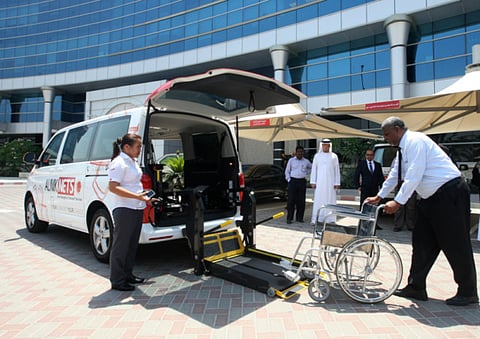Dedicated Dubai taxis for hospitals
Customised vehicles launched for patients and senior citizens in Dubai

Dubai: Hospitals and patients will now have dedicated taxis in Dubai, offering specialised service round the clock, the Roads and Transport Authority (RTA) has announced.
The service, named Aunik, operated by Non-Emergency Transport Services (NETS) in association with RTA, was launched on Sunday by Dr Yousuf Al Ali, CEO of RTA’s Public Transport Agency.
The first of its kind service in the region, the dedicated taxis are equipped with wheelchair lift, customised seating facilities for patients as well as a trained driver.
“The vehicles are designed for non-emergency travel for patients who require regular trips to hospitals as well as picking up and dropping of patients from hospitals who cannot travel by regular vehicles,” said Paul Wells, CEO of NETS, who operated a similar service in the UK for 10 years.
Dubai becomes the third city in the world after London and Dublin to have such a service, with 10 dedicated vehicles deployed in phase one. The number of vehicles is likely to grow in the next phase.
“We will definitely increase the number in the next phase depending on the response we get. These taxis will be dedicated to various hospitals but will be based at Saudi German Hospital where we have our call centre,” added Wells, who also plans to expand the service to other emirates as well as neighbouring Saudi Arabia.
However, the taxis cannot pick up customers from other emirates for now, but can drop patients from hospitals in Dubai to other emirates.
The taxis can be hired through phone by calling 04-4150000 or from hospital receptions as well as from outside the hospitals.
Starting fare for the Aunik taxis differ depending on how a person avails of the service. Aunik taxis could be hired from outside the hospitals for a starting fare of Dh5, while those booked through call centres or through hospital receptions will have a starting fare of Dh8. An additional Dh10 will be charged for wheelchairs.
“What we are offering is high-end transport services for those with medical needs at a very reasonable price. This is not an ambulance but a non-emergency vehicle with a driver trained to handle patients,” said Al Ali.
He said the Aunik taxi is different from RTA’s regular handicap taxi service in more ways than one and both the services will operate simultaneously.
“These taxis are not for people with special needs alone. We have seen a need to serve patients who don’t need ambulances to transport them but they also can’t travel by regular vehicles. Certain people post-surgery or dialysis patients need special vehicles to travel. These vehicles will offer great comfort to them. At RTA we attach great importance to providing high-quality services to every segment of the society,” added Al Ali.
He said RTA provides continuous support to people with special needs as well as senior citizens.
“RTA has issued 4,591 permits for the disabled from 2011 to the end of 2013. The RTA also issued 264 Blue Nol Cards from 2011 to 2013, 3,217 parking permits, and 88 driving permits for people with special needs,” said Al Ali.



